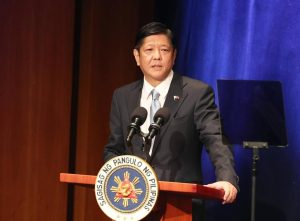The speech of Philippine President Ferdinand Marcos Jr. at the 77th Session of the United Nations General Assembly and his bilateral meeting with United States President Joe Biden could be the highlight of his recent six-day working visit in New York, but his talks in other less prominent public activities also provided a peek into his thinking and the priorities of his government.
For example, Marcos emphasized the role of agriculture in attaining food security during a talk in front of some members of the Filipino community in New York.
“You can encourage your young relatives back home to take college courses related to agriculture. If you have idle lands in the Philippines, ask your families to take care of them and help them develop them for agriculture,” he said.
The leader also asked his fellow Filipinos to reverse the country’s brain drain, calling on scientists, engineers, and technical experts to return home and share their expertise to help the country propel forward.
His message was consistent in all his meetings with American companies, business groups, and financial institutions. He repeatedly assured his audience that “the time to invest in the Philippines is no longer just sometime in the future, it is now.” His speech at the New York Stock Exchange sums up his sales pitch to potential investors.
“First, we passed legislation to lower corporate income tax rates and rationalize fiscal incentives. Second, we reduced the minimum paid-up capital requirements for foreign retailers and foreign startups bringing in advanced new technology. And third, we now allow full foreign ownership of companies providing public services, such as telecommunications, shipping, air carriers, railways, subways, airports, and toll roads,” he said.
Marcos was indirectly praising the legacy of former President Rodrigo Duterte, since all the reforms he mentioned were done during the term of his predecessor. It shows that his presidency represents continuity and that Duterte, despite his global disrepute for waging a brutal “war on drugs,” paved the way to boost the interest of big business.
It was during the open forum at an Asia Society event that Marcos articulated some of his thoughts on foreign policy. He explained the country’s relationship with China in this way: “The position that the Philippines takes is that we have no territorial conflict with China. What we have are China claiming territory that belongs to the Philippines.”
He added that he seeks to broaden his government’s engagement with China instead of simply focusing on the maritime dispute.
“I have always told my Chinese friends and I said let us not make our differences concerning maritime – like the baselines, the economic zones, etc. – let us not make that the defining element of our relationship,” he said. “Because if that is the only defining – if that will be the defining part of our relationship, then we are really at a standstill.”
Marcos pushed for a stronger role for the Association of Southeast Asian Nations (ASEAN) in tackling matters related to China, and he welcomed the Quad and AUKUS as mechanisms that “help prevent destabilizing actions in the region.” He also rejected the use of nuclear weapons as a form of deterrence and called for the reduction of the global stockpile of this type of armament.
Asked about the anti-drug campaign, Marcos said the focus and methodology will change as he directed law enforcement agencies to prioritize drug prevention and rehabilitation.
He was less direct when he responded to a question about the pending cases against news website Rappler and Filipino-American Nobel Laureate Maria Ressa. He simply stated that Rappler continues to operate and that he cannot interfere in the affairs of the judiciary.
Marcos highlighted the main points of his UN speech when he arrived back in the Philippines. “I addressed global issues that require a united global action, such as climate change, rising food prices, rapid technological change, the peaceful resolution of international disputes, the need to protect the vulnerable sectors of our society such as migrants, and ending all forms of prejudice.”
Indeed, Marcos delivered forceful words when he decried climate injustice and vaccine inequity, and when he condemned racism and Asian hate.
But for those who watched the live U.N. session, which took place early in the morning Manila-time, there were some who noticed the irony about Honduran President Xiomara Castro denouncing the dictatorship and human rights abuses in her country right before Marcos was called to address his fellow leaders. Marcos’ father ruled as dictator for two decades before his ouster from power in 1986.
Marcos believes his state visit to the U.S. was a success because of the positive response to his call for unity on a global scale. What he didn’t mention was that the trip served as a symbolic victory for his family because prior to becoming president this year, he could not go back to the U.S. because he has a standing warrant of arrest for contempt of court in Hawaii.
It also went unmentioned in Marcos’ talks and public engagements that his trip coincided with the 50th anniversary of his father’s declaration of Martial Law in the Philippines. Maybe it was deliberately omitted in his speeches because he would have sounded hypocritical for talking about prosperity and openness while denying the lingering negative impact of Martial Law on the Philippine economy and democracy.
































